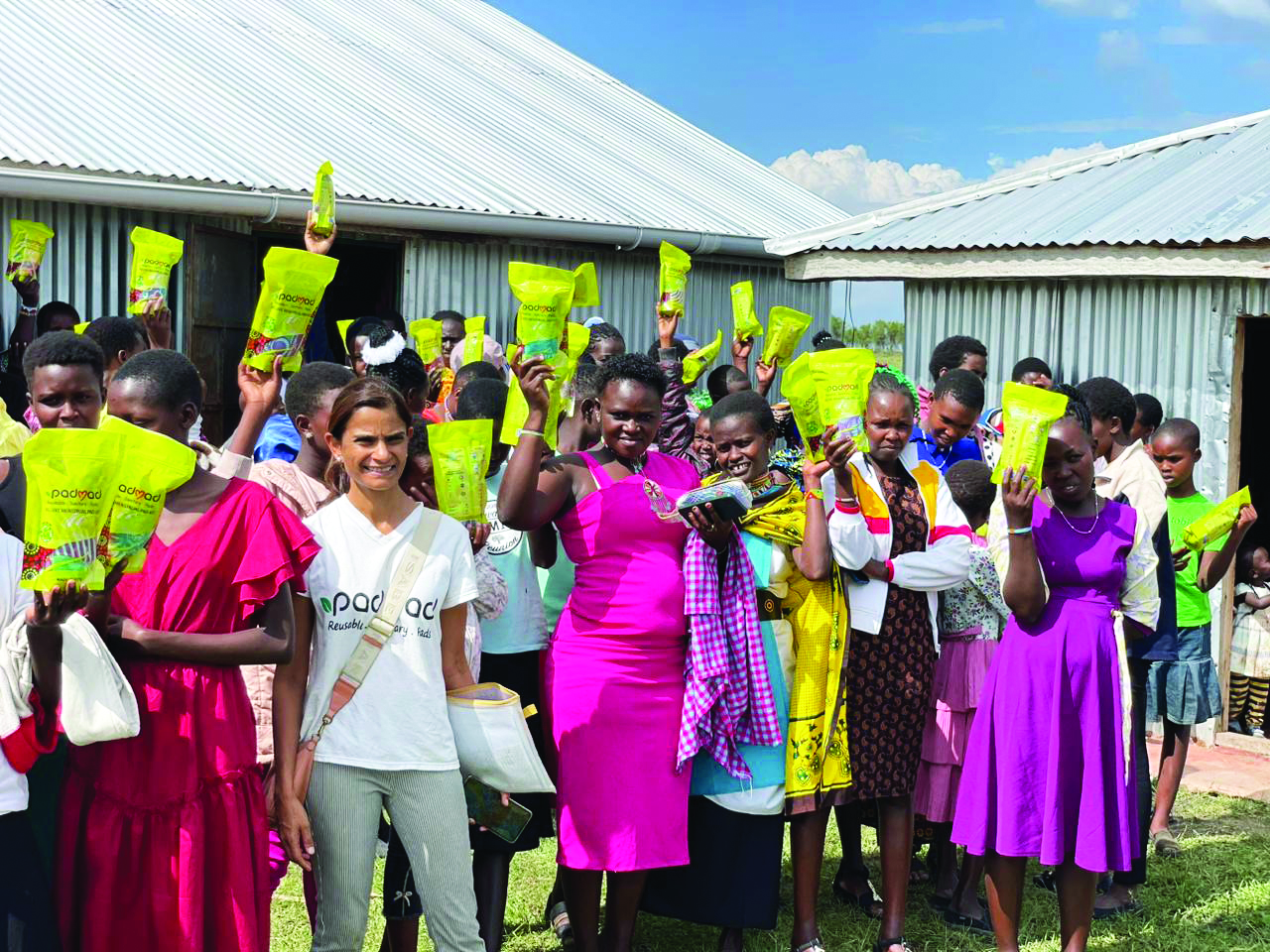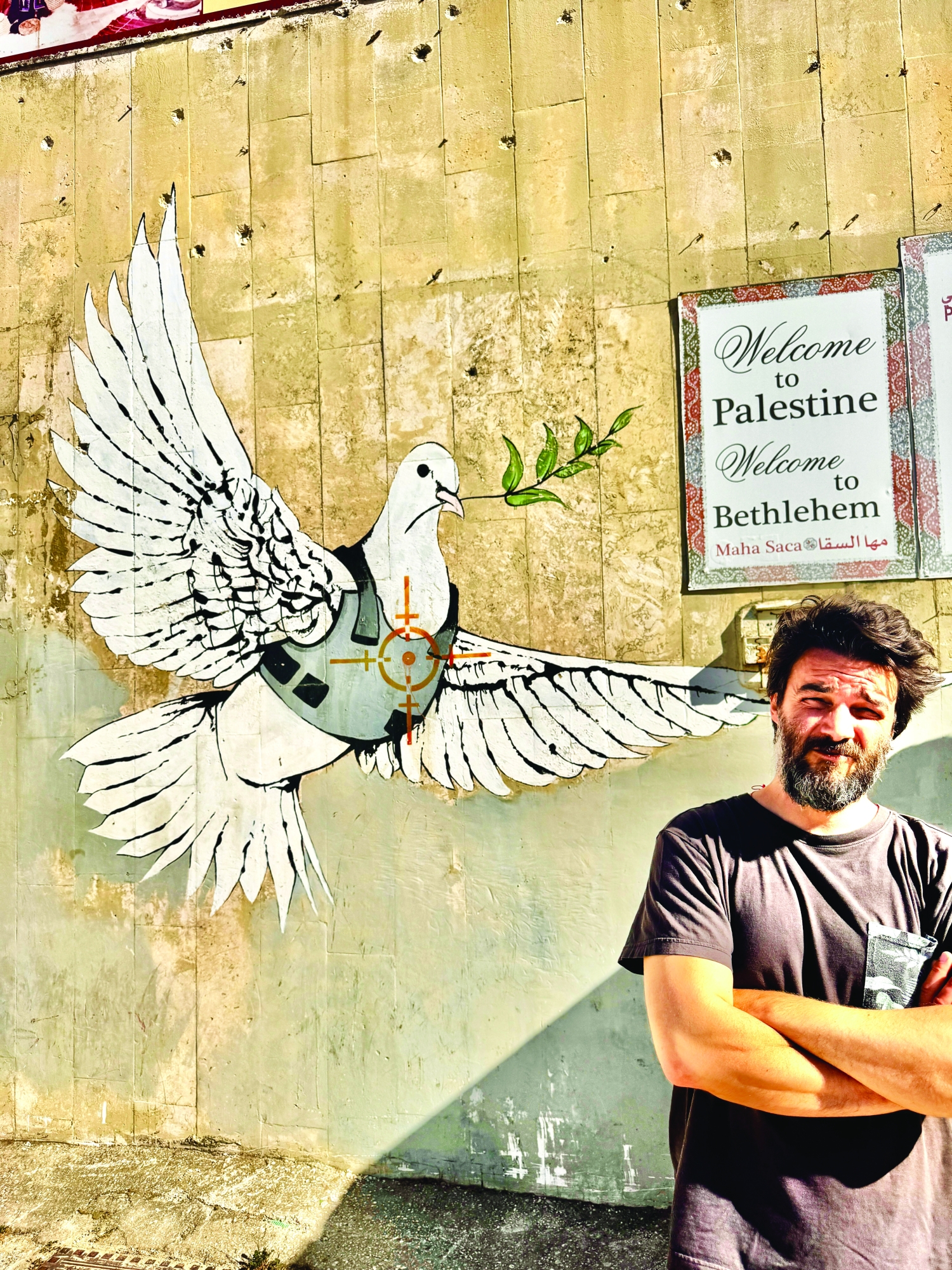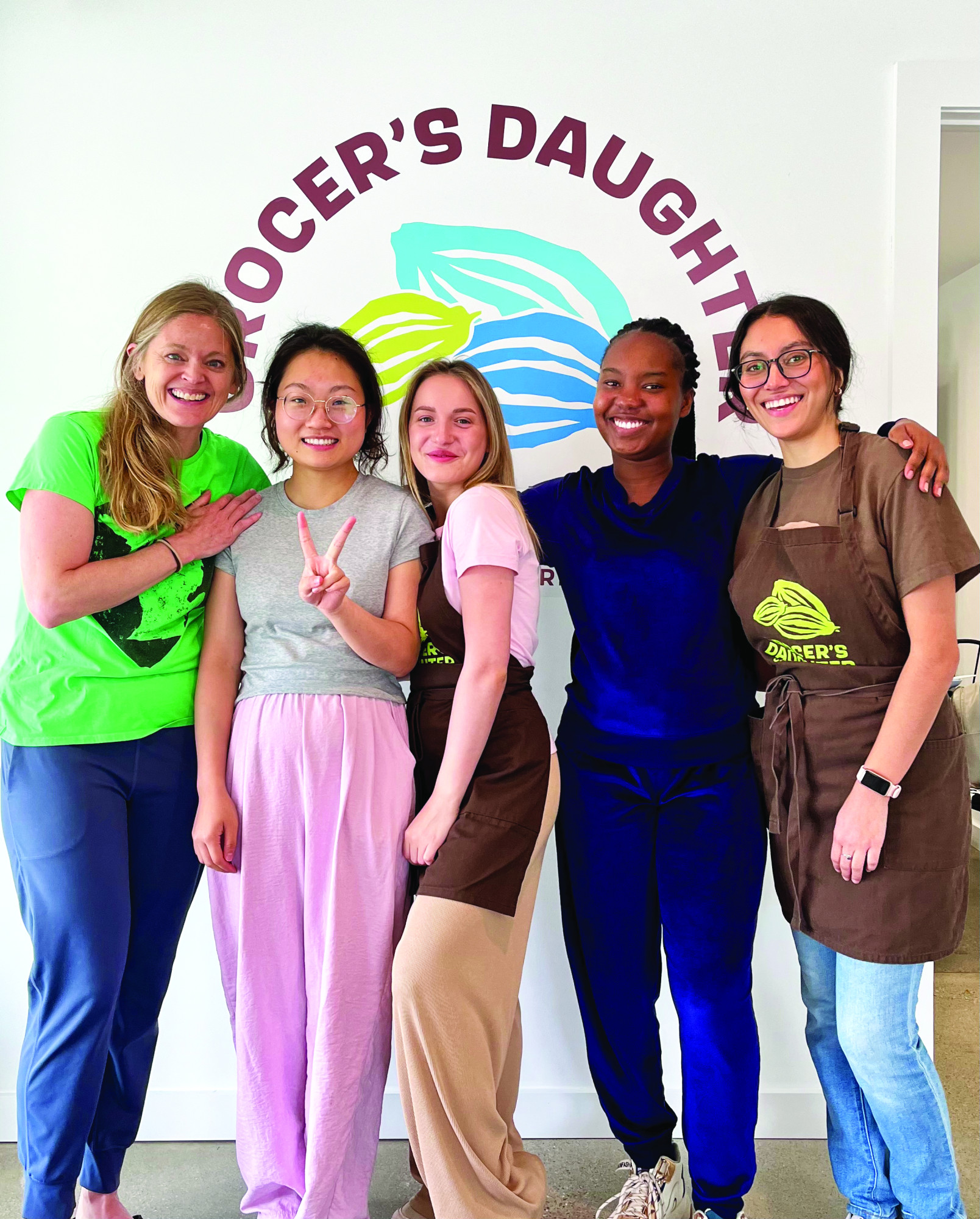Global changemaker Madhvi Dalal travels from her native Kenya to Northern Michigan this October for a series of events at which she’ll share solutions to some of the most surprising and challenging issues facing women and girls across the world. The visit expands a partnership between Dalal and the Uplift Travel Foundation—a Leelanau-based nonprofit where participants travel with a purpose, walking alongside local visionaries to help them solve their community’s most pressing issues while finding authentic connections and friendships that transcend borders. Uplift has worked with Dalal to provide reusable menstrual pads and empowerment training to women in villages across Kenya’s Maasai Mara. The project now also includes Northwestern Michigan College staff and students in a variety of exciting ways.
In Tremé, life always seemed to teeter on the edge. Heat and humidity pressed down until it broke loose in sudden bursts: a fight, a chase, gunshots, sirens. Violence could turn savage without warning. And yet, on Sunday afternoons, a brass band would come down Villere Street, horns lifting the air, and for a while the same pressure fed joy instead of rage. That tension seeped into me, writes Andrea Claire Morningstar. When Hurricane Katrina arrived on Aug. 29, 2005, the levees broke, and the city slipped into nightmare on my television screen in Michigan, all I could think of were the dogs—the pack roaming my block, the puppy abandoned in the park, the neighbor’s chained rottweiler. I cried for the dogs. Where was my downstairs neighbor with her bandaged fist? Had the water reached the second floor with its shattered glass windows? The old man singing along to The Wizard of Oz? The second line band that graced Villere Street on Sunday afternoons?
Share this:
- Share on Facebook (Opens in new window) Facebook
- Share on X (Opens in new window) X
- Email a link to a friend (Opens in new window) Email
- Share on Reddit (Opens in new window) Reddit
- Share on Pinterest (Opens in new window) Pinterest
- Share on LinkedIn (Opens in new window) LinkedIn
- Print (Opens in new window) Print
- Share on Tumblr (Opens in new window) Tumblr
“Genocide” is most commonly invoked in the past tense, used to describe an historical event. While genocides are underway they are often overshadowed by the larger context of war and can go unrecognized in the day to day, a civilian bombing here, a displacement there. Then there are refugee migrations, and forced famine. Most often it is from the safety of hindsight that a genocide be universally accepted as such and join the history books along side those of Armenia, Rwanda, Darfur, Cambodia, Germany and Srebrenica, to name just a few from recent history. Because in the past, due to the limits of gathering and disseminating information, many indicators of genocide of the past went unnoticed, the momentum of the killing would outpace the ability of society to identify a genocide and respond. Yet today we are watching in real time as it’s horrors unfold in Gaza. This is new terrain.
Share this:
- Share on Facebook (Opens in new window) Facebook
- Share on X (Opens in new window) X
- Email a link to a friend (Opens in new window) Email
- Share on Reddit (Opens in new window) Reddit
- Share on Pinterest (Opens in new window) Pinterest
- Share on LinkedIn (Opens in new window) LinkedIn
- Print (Opens in new window) Print
- Share on Tumblr (Opens in new window) Tumblr
As young international development workers in Africa in the 1980s-1990s, we wondered why people often displayed a photo of President John F. Kennedy in their homes. Here’s why. In 1961, President Kennedy proposed the establishment of USAID (the United States Agency for International Development) the same year he called for the creation of the Peace Corps. USAID is not partisan, write Phyllis & Dan Craun-Selka, residents of Lake Ann, Michigan, who worked with USAID for some 35 years in 30 countries. Our foreign policy depends on the 3 Ds- Defense, Diplomacy, and Development working together to keep America safe. Department of Defense leaders will tell you that USAID prevents wars. President Reagan increased the USAID budget linked to a national policy to promote democracy and business around the world. President George W. Bush’s PEPFAR (President’s Emergency Program for AIDS Relief), authorized by Congress, became the most successful aid program ever, so far, saving more than 26 million people. PEPFAR has made America safer and more secure with the AIDS pandemic under better control.
Share this:
- Share on Facebook (Opens in new window) Facebook
- Share on X (Opens in new window) X
- Email a link to a friend (Opens in new window) Email
- Share on Reddit (Opens in new window) Reddit
- Share on Pinterest (Opens in new window) Pinterest
- Share on LinkedIn (Opens in new window) LinkedIn
- Print (Opens in new window) Print
- Share on Tumblr (Opens in new window) Tumblr
Twenty years ago, when Paul Sutherland joined the board of Safe Passage, which launched a school for the children of the Guatemala City garbage dump, he also helped kickstart what has become a dynamic and ongoing relationship between Leelanau County citizens and Guatemala. In the decades since then, local schools have sent students, and teams of volunteers have joined cultural exchange trips to the beautiful, yet economically unequal, Central American nation. Since the COVID-19 pandemic abated, Guatemalan nonprofit Planting Seeds has hosted “service learning” groups from Northwestern Michigan College as well as Leelanau Investing for Teens (LIFT) and Leland High School. Planting Seeds co-director and Illinois native Mac Philips will visit Leelanau County this weekend to raise awareness about the nonprofit and build support in northern Michigan. He’ll visit Grocer’s Daughter Chocolate on Saturday, Suttons Bay Congregational Church on Sunday, and students in Suttons Bay and Leland.
Share this:
- Share on Facebook (Opens in new window) Facebook
- Share on X (Opens in new window) X
- Email a link to a friend (Opens in new window) Email
- Share on Reddit (Opens in new window) Reddit
- Share on Pinterest (Opens in new window) Pinterest
- Share on LinkedIn (Opens in new window) LinkedIn
- Print (Opens in new window) Print
- Share on Tumblr (Opens in new window) Tumblr
In October, the local organization Mideast: JustPeace held a community gathering to talk frankly about the dilemma those of us who care about Palestine and the Middle East face: cast a protest vote, or vote for Vice President Kamala Harris, knowing that things are likely to be worse under Donald Trump. Or at least equally bad. So in this presidential election year, what are we to do? Our choices are poor as far as American policy toward Israel is concerned.
Share this:
- Share on Facebook (Opens in new window) Facebook
- Share on X (Opens in new window) X
- Email a link to a friend (Opens in new window) Email
- Share on Reddit (Opens in new window) Reddit
- Share on Pinterest (Opens in new window) Pinterest
- Share on LinkedIn (Opens in new window) LinkedIn
- Print (Opens in new window) Print
- Share on Tumblr (Opens in new window) Tumblr
It’s hard to prioritize writing in the aftermath of Hurricane Helene, while my small community of Celo, North Carolina—an hour by car from Asheville—is still knee-deep in mud, grief, and destruction, writes Katey Schultz. But we’re also heart-deep in resourcefulness, compassion, and perseverance. What could one resident of rural Yancey County have to say to the residents of Leelanau County, nearly 1,000 miles away? Having spent parts of 13 summers in upper northwest Michigan, and a few winters too, I know a close-knit, take-care-of-your-people kind of place. It’s the kind of place I come from, and it’s the kind of place I believe might actually listen if I say there is one thing you can do today that has nothing to do with dollars, blankets, or water, that will help you survive in the aftermath of a disaster. Talk to your neighbors. Yes, the ones you already know. And yes, the ones with the political signs in their yards that don’t match yours. These are the people whose survival you will depend upon, and these are the people you will most immediately be able to help.
Share this:
- Share on Facebook (Opens in new window) Facebook
- Share on X (Opens in new window) X
- Email a link to a friend (Opens in new window) Email
- Share on Reddit (Opens in new window) Reddit
- Share on Pinterest (Opens in new window) Pinterest
- Share on LinkedIn (Opens in new window) LinkedIn
- Print (Opens in new window) Print
- Share on Tumblr (Opens in new window) Tumblr
Thanks to the U.S. Department of State’s J-1 visa Cultural Exchange program, Empire and Glen Arbor businesses have a rich diversity of young folks from all over the world working here through the busy summer season. Cherry Republic and Anderson’s Market in Glen Arbor have staff from countries including Turkey, Jordan, and China working through August and into the fall. So do smaller businesses including Grocer’s Daughter Chocolate in Empire and Laker Shakes in Burdickville. In honor of Labor Day, we profiled a few of those J-1 workers.
Share this:
- Share on Facebook (Opens in new window) Facebook
- Share on X (Opens in new window) X
- Email a link to a friend (Opens in new window) Email
- Share on Reddit (Opens in new window) Reddit
- Share on Pinterest (Opens in new window) Pinterest
- Share on LinkedIn (Opens in new window) LinkedIn
- Print (Opens in new window) Print
- Share on Tumblr (Opens in new window) Tumblr
The Niagara Escarpment rises from the Earth east of Rochester, New York. It extends over 650 miles across the top of the Great Lakes basin to Lake Michigan’s western limits on Wisconsin’s shore. The escarpment’s defining feature is its dolomite limestone, dating back to the Silurian age of the Paleozoic era. It has aged well. That’s where we, four northern Michigan men, enter the story, searching for adventure to help us age just as gracefully. Steve Nance, Evan Smith, Timothy Young, and I set off to follow the Niagara and challenge ourselves to swim in each of the five great lakes on the longest day of the year, June 20, the summer solstice.
Share this:
- Share on Facebook (Opens in new window) Facebook
- Share on X (Opens in new window) X
- Email a link to a friend (Opens in new window) Email
- Share on Reddit (Opens in new window) Reddit
- Share on Pinterest (Opens in new window) Pinterest
- Share on LinkedIn (Opens in new window) LinkedIn
- Print (Opens in new window) Print
- Share on Tumblr (Opens in new window) Tumblr
Priest José Luis Díaz Cruz and Sergio Jose Cárdenas Flores, political asylees from Nicaragua, have been living in the rectory at St. Philip Neri Catholic Church in Empire since March after they escaped the autocratic Ortega regime, which has cracked down on dissent and persecuted the Roman Catholic Church. Originally from the city of Matagalpa, Díaz and Cárdenas were among dozens imprisoned for six months in the capital of Managua after living under house arrest in their church last August. In February, they were among 222 political prisoners flown to the United States after being forced to relinquish their Nicaraguan citizenship. “We’re offering them a safe place to be,” said Rev. Ken Stachnik at St. Philip Neri. “This is important because it’s in the gospel. We are watching out for those who are lost and have no place to go.” The push to bring the Nicaraguans to northern Michigan came from Reverend Wayne Dziekan with the Diocese of Gaylord and who co-directs the Justice and Peace Advocacy Center, an organization which helps asylees and migrant workers in northern Michigan. Matagalpa and Gaylord are sister diocese.
Share this:
- Share on Facebook (Opens in new window) Facebook
- Share on X (Opens in new window) X
- Email a link to a friend (Opens in new window) Email
- Share on Reddit (Opens in new window) Reddit
- Share on Pinterest (Opens in new window) Pinterest
- Share on LinkedIn (Opens in new window) LinkedIn
- Print (Opens in new window) Print
- Share on Tumblr (Opens in new window) Tumblr










